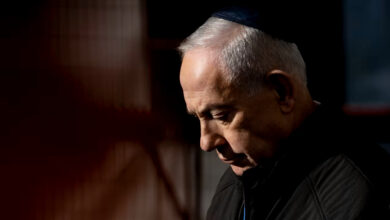TEL AVIV – Thousands of young Israelis have taken to the streets across the country over the past several weeks to demand a more “just society”. With tent cities cropping up in virtually all major urban centers, Israeli Prime Minister Benjamin Netanyahu is feeling the heat of what analysts have labeled the most formidable threat so far to his political future.
More than 350,000 people demonstrated in Tel Aviv, Jerusalem and Haifa in early August in one of the largest demonstrations in Israel’s history.
And it all started with some cheese.
Back in June, Yitzhak Alron, a synagogue employee from the city of Bnei Brak near Tel Aviv, found himself unable to make ends meet due to the rising cost of basic food products. The price of cottage cheese, for instance, had jumped 40 percent to US$2.30. In frustration, Alron posted an angry remark on Facebook.
Soon thousands of poor people across Israel joined Alron and launched a consumer boycott of the so-called tycoons – the rich families that control major supermarket chains and other businesses. More than 100,000 people joined the Facebook page created by Alron.
Alron, who until recently had lived a quiet life with his wife and children, was clearly tapping into a frustration that simmered under the surface of Israeli society. But his venting, it turned out, was only the beginning.
In July, Dafna Leef, a 25-year-old film school graduate from Tel Aviv, received a message from her landlord that her lease had expired. But while looking for a new apartment she soon realized that rent had more than doubled in recent years. She simply couldn’t afford to get a new flat.
Leef decided to grab a few belongings, including a tent, and she set up her temporary home on the pavement of Rothschild Boulevard, one of Tel Aviv’s main promenades. Surprisingly, the next day another ten people had joined her with their own tents.
“It was amazing. People from all over wanted to join us. After a week, more than 5000 [people] had moved into the streets,” Leef says.
With tent encampments now sprouting up all over the country, Israel’s social activists no longer limit their struggle strictly to addressing housing or food staple inflation.
“We want decent education, health services and welfare,” says Leef, the previously unknown leader of the mass movement. Surrounded by the boulevard’s elegant high-rise office buildings, Leef has sparked a unique struggle to fundamentally change Israeli society.
By some European standards, Israel is actually doing fairly well. While Greece, Spain and Italy struggle with huge deficits that effectively undermine the Euro, Israel has found itself in the rare position of being a beacon of economic stability in uncertain global times. The Israeli economy continues to expand by more than three percent annually, and Israel’s technological industry has built a reputation as a force of innovation on the global market.
The state of Israel also offers socialized health services, a residual policy from earlier days of the more socialist agendas in government that dominated the country until the 1970s. Every citizen has access to health services.
The universities also offer high-level education. And in the past decade alone, Israeli scientists have received nine Nobel prizes, an impressive accomplishment for a country of only 7.7 million people.
But for several years many Israelis have felt their country is deteriorating at its core. Corruption has reached alarming levels. Former Prime Minister Ehud Olmert was forced to resign from power in 2009 over such charges.
The peace process with the Palestinians is going nowhere. But equally important for many, the government’s policy of lowering welfare support while allowing a hand-full of rich families to dominate broad sectors of the economy, has forced even members of the educated middle class, like protest leader and filmmaker Leef, into poverty.
So for many in Israel, the young people demanding a new political agenda represent hope for their country’s future.
Ironically, the tent city on Rothschild Boulevard was set up exactly where Tel Aviv was first established some 102 years ago. In 1909 a group of Jews left the city of Jaffa, and gathered on a sand dune a few kilometers north.
They dreamed of establishing a new city based on a liberal vision, with cafes, operas, concert halls and cinemas. They held lotteries for small plots of land along a line marked in the sand. Soon families built their first homes on land that became Rothschild Boulevard.
But a century later, those days of social solidarity seem long gone. Israel’s welfare policies, which created the modern state of Israel, were replaced by elements of raw capitalism. Along Rothschild Boulevard, banks and insurance companies have replaced the small homes of Tel Aviv’s first residents.
Now many of the demonstrators, recalling that earlier vision, live in tents and dream of a more humane Israel based on social solidarity that reaches across the economic spectrum.
The Israelis pouring into the streets today belong to what is often called “the silent majority”. They are mainly secular and ideologically distant from the hard-line government figures leading the country.
For years Israel has been dominated by a coalition of political minority groups belonging to the far right. Those groups include the so-called “Russians”, the descendents of families that fled Soviet states led by Foreign Minister Avigdor Lieberman, and the settlers with their ultra-nationalist supporters. The protesters also lament the disproportionate influence of the ultra-orthodox Jews.
Israelis belonging to the “silent majority” tend to feel their country has been stolen from them. And now, according to the demonstrators, the time has come to reclaim their country.
Today the demonstrators’ struggle is no longer strictly about economic demands, but also about Israel’s fundamental character. Not surprisingly, during a recent street concert in Tel Aviv, Shlomo Artzi, an old, popular musician, sung a tune that resonated well with the protesters: “We are dreaming of a new country”.
The protests across Israel erupted four months after the revolution in Egypt. And Israeli demonstrators don’t hide their source of inspiration.
In the evenings, protesters in Tel Aviv routinely meet at an intersection they have dubbed Tahrir corner. There they debate and hear visiting lecturers. Despite decades of an uneasy peace agreement with Cairo, many Israelis feel a deep admiration for the Egyptian revolution.
But Prime Minister Netanyahu, an individual with his political future at stake, has proven to be one of the last people to sense the winds of change in Israel. Only weeks before demonstrators stormed Israel's streets, Netanyahu mocked the pro-democracy protests sweeping many Arab countries.
“There’s only one country in the heart of the Middle East that has no tremors, no protests…Look at this. Earth shaking everywhere, west of India right up to the Straits of Gibraltar,” Netanyahu told a US news channel at the end of March. “Everything is shaking and rocking and the only stable place, the only stable country, is this democracy Israel – a developed country, prosperous country, everybody is equal under the law…”
Recently, an Israeli pop-artist added music and rhythm to Netanyahu’s less than fitting words, and the humorous and sarcastic video clip has become popular on YouTube.
Netanyahu eventually caved in and set up a commission to engage the protesters in dialogue and reform Israel’s economic priorities. But for Tzipi Livni, the head of the opposition, economic reforms are no longer enough. The demonstrators, she says, are demanding a new and different Israel.
“The protests must come to an end with the birth of a just Israel,” she said in the Knesset, Israel’s parliament, this week.




